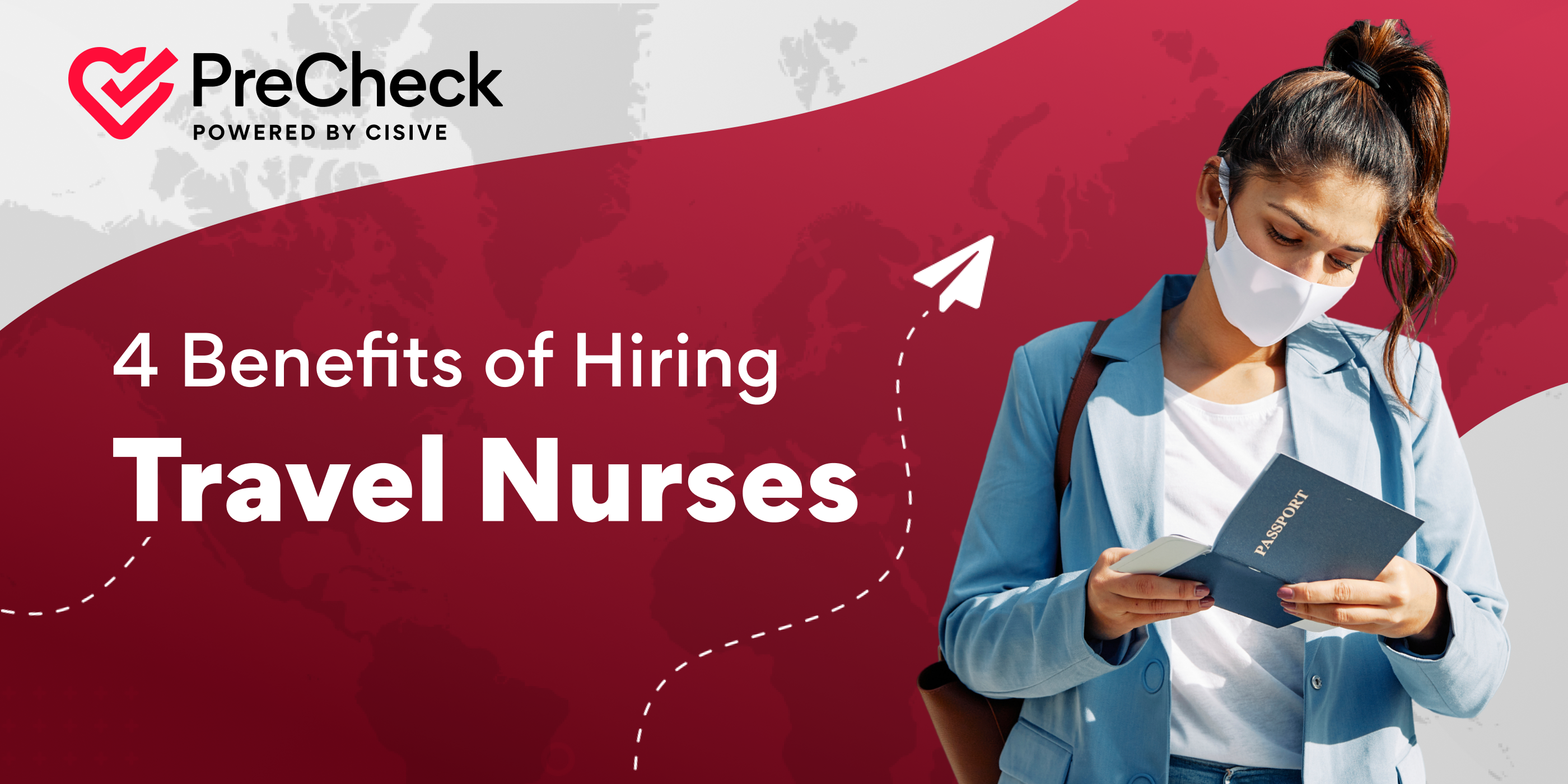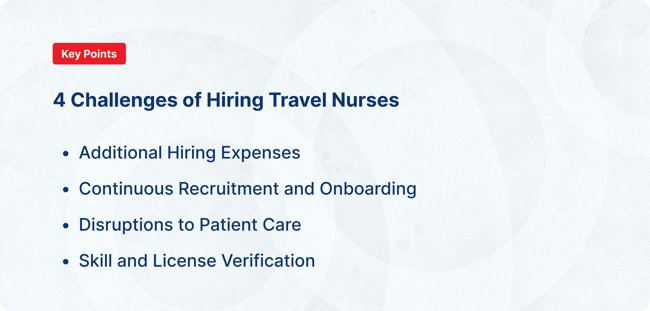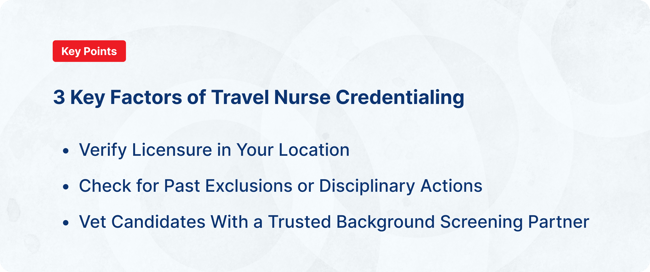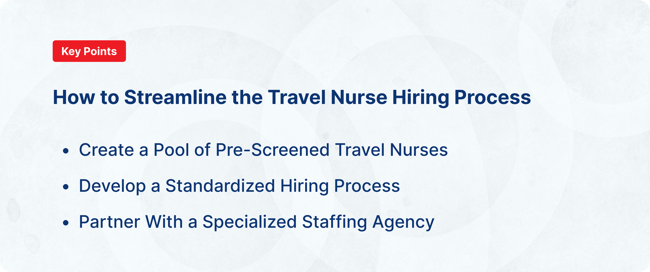
.jpg?height=200&name=BLOG_%20Nursing%20Background%20Check%20Requirements_%20What%20You%20Need%20to%20Know%20(Refreshed).jpg)
Ensuring quality patient care requires you to maintain knowledge of and compliance with your...

Travel nurses provide much-needed flexibility and expertise to healthcare teams. However, the process of hiring and credentialing registered nurses across locations is fraught with complexities, including verifying qualifications and following state-specific regulations. By understanding travel nurse challenges, healthcare organizations can improve staffing solutions, patient care, and operational efficiency.
Explore the benefits and challenges of hiring travel nurses, and learn how to streamline the hiring process for these valuable healthcare providers.
Key Takeaways
|
Table of Contents:
As the healthcare industry looks to overcome a nursing shortage, travel nurses remain in high demand. Travel nurse job openings peaked in 2022 at more than six times pre-pandemic levels, according to Staffing Industry Analysts and remain elevated today. Employers continue to rely on travel nurses because they offer flexibility and can quickly be deployed to areas with the greatest need.
Demand for travel nurses could continue growing amid an aging population and a greater need for healthcare services. Your healthcare system must compete to attract and retain travel nurses, who can command high salaries and benefits.
Hiring travel nurses offers a range of benefits for healthcare facilities. Here are some of the ways travel nurses can improve your operations.
The flexibility of travel nursing is a key benefit, as they can be deployed to areas of urgent need, whether that’s during peak season, to overcome staff shortages, or to meet unexpected events. This flexibility allows healthcare facilities to adjust their staffing levels based on patient demand, improve resource allocation, and reduce the burden on permanent staff.
Travel nurses can be more economical than hiring permanent staff when considering total compensation. Additionally, travel nurses are typically paid on a per-diem basis, providing greater control over labor expenses and helping healthcare facilities manage their budgets.
When hiring travel nurses, organizations can target specialized skills and expertise that may not be readily available among permanent staff. Travel nurses often bring a range of knowledge from working in different healthcare settings, which can improve overall quality of care. These nurses’ experience with different practices and protocols allows them to share ideas and contribute to professional development for other nurses within the organization.
The demand for specific requirements and skills among travel assignments is highest in med-surge, followed by emergency room assignments and step-down travel nursing.
Employers that combine staff nurses and travel nurses can sustain a higher quality of patient care. Research shows that care quality remains constant even as the use of travel nurses increases. Furthermore, by closing staffing gaps, healthcare systems can decrease burnout among full-time staff who are suffering from high patient loads, long hours, and poor work-life balance.

Hiring travel nurses isn’t without challenges for healthcare facilities, including licensing requirements, schedule management and handling contracts. Learn more about why hiring travel nurses can be more complex than hiring permanent staff.
Although hiring travel nurses often lowers costs associated with long-term hiring, it can drive additional short-term expenses. Travel nurses typically receive higher hourly rates, along with travel stipends, housing allowances, and other benefits, which can strain healthcare organizations' near-term budgets.
The transient nature of travel nursing means that there is a constant need to recruit, screen, and onboard new nurses to fill temporary positions. This process can be time-consuming and resource-intensive, requiring significant efforts from HR and nursing management teams.
Sourcing qualified travel nurses can also be difficult, especially during times of peak patient demand or when other employers are competing for the same skilled nurses.
Disruptions to patient care can occur as travel nurses transition in and out of healthcare organizations. Additionally, travel nurses need time to familiarize themselves with the organization's policies, procedures, and patient population, which can affect continuity of care. Negative effects can include miscommunication among healthcare professionals, delays in patient treatment, and medication errors.
Healthcare organizations must have rigorous credentialing and privileging processes in place to verify travel nurses' licenses, certifications, and competencies. This process can include background checks, reviewing references, and assessing clinical skills and knowledge. Failure to properly credential travel nurses increases the risk of medical errors and can compromise patient safety.

Credentialing ensures that employers hire travel nurses with the necessary qualifications and skills. Here’s what you need to know about the credentialing process related to travel nursing.
Verifying travel nurse credentials includes checking their active nursing licenses, certifications, and educational background. Don’t just take a candidate’s word; contact issuing bodies directly to confirm a credential’s authenticity and validity. A thorough verification process mitigates the risk of employing unqualified travel nurses and falling out of compliance.
Multiple states have streamlined the licensure process through the Nurse Licensure Compact (NLC), which is a multistate license allowing nurses to move between participating states more easily.
Another critical aspect of credentialing is checking the Office of the Inspector General’s Exclusion List and the National Practitioner Data Bank (NPDB) for disciplinary actions or malpractice claims against travel nurses. Reviewing these sources will identify red flags, disqualified candidates, or other concerns that could affect patient safety or the organization's reputation.
Checking references and talking to previous employers are valuable steps in the credentialing process. References can illuminate a travel nurse's professional behavior, work ethic, and interpersonal skills. Positive feedback and references from previous employers serve as additional validation of the travel nurse's competence and suitability for the role.
A trusted background screening partner can answer all your travel nursing questions. They’ll also conduct reference checks, contact past employers, and streamline additional tasks, such as drug screenings. All of these nurse background check services speed up time to hire.

Many healthcare organizations are hiring travel nurses to fill urgent needs. Streamlining the travel nurse hiring process without compromising standards or patient safety is imperative. Here are best practices for speeding up time to hire.
Develop a database of travel nurses who already meet your organization's criteria and qualifications. This pool of pre-screened candidates enables organizations to quickly identify and engage suitable nurses when the need arises. Make sure to regularly update this database to ensure such candidates remain qualified.
Consistent hiring processes save time and reduce confusion. Create a process tailored to travel nurses that covers every step of hiring, from posting job openings to conducting interviews and making hiring decisions. Consistency improves recruiting efficiency and reduces time to fill.
Partnering with a reputable travel nursing agency can streamline the hiring process. These agencies have a network of pre-screened travel nurses and can assist with recruitment, screening, and credentialing, saving healthcare organizations valuable time and resources.
As your healthcare facility develop your own protocols to onboard travel nurses, Cisive can help overcome the challenges of hiring so you can focus on providing the best possible healthcare services to your patients.
Cisive's advanced technology and streamlined processes can significantly speed up the hiring and credentialing of travel nurses, allowing them to start working on the floor faster. This not only saves time and resources for your healthcare facility but also ensures that patients receive high-quality care from experienced and qualified travel nurses.
Want more answers to your travel nursing questions? Schedule a call with one of our background screening experts.
Author: Cisive Staff
Bio: Contributed by a member of our staff with expertise in background screening for highly regulated industries.
Let's Connect on LinkedIn.jpg?height=200&name=BLOG_%20Nursing%20Background%20Check%20Requirements_%20What%20You%20Need%20to%20Know%20(Refreshed).jpg)
Ensuring quality patient care requires you to maintain knowledge of and compliance with your...

The nursing shortage is a critical issue affecting healthcare systems worldwide, and the United...

For your organization to succeed, you need talented employees who can handle a wide range of...